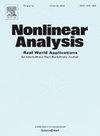Global solvability of large initial data to three-dimensional compressible MHD equations with density-dependent viscosities
IF 1.8
3区 数学
Q1 MATHEMATICS, APPLIED
引用次数: 0
Abstract
This paper studies the three-dimensional isentropic compressible magnetohydrodynamic equations with density-dependent viscosities, considering both the Cauchy problem and periodic problem. We prove that the strong solution exists globally provided that the initial density is large enough. This is a result that generalizes previous classical results which the solutions have small perturbations from the resting state. This result can also be seen as an extension of the results for Yu [Math. Methods Appl. Sci., 46 (2023) 10123–10136] and Huang–Li–Zhang [arXiv:2408.04305, 2024], who established similar results for the compressible Navier–Stokes equations. At the same time, this article improves on Li–Lu–Shang’s recent result [arXiv:2408.04995, 2024] on the compressible MHD equations. The key idea of the proof is to establish an effective energy functional about density, velocity and magnetic field, which combines Huang–Li–Zhang’s article [arXiv:2408.04305, 2024] on the barotropic compressible Navier–Stokes equations with Fan–Gu–Huang’s techniques [Discrete Contin. Dyn. Syst., 45 (2025) 2628–2649] on the non-homogeneous incompressible MHD equations.
具有密度依赖粘度的三维可压缩MHD方程的大初始数据的全局可解性
考虑柯西问题和周期问题,研究了具有密度依赖黏度的三维等熵可压缩磁流体动力学方程。证明了在初始密度足够大的条件下,强解在全局上存在。这是一个推广以往经典结果的结果,这些结果的解从静息状态有很小的扰动。这个结果也可以看作是Yu [Math]的结果的延伸。方法:。科学。黄立章[j],建立了可压缩Navier-Stokes方程的类似结果[j] .物理学报,46(2023):10123-10136。同时,本文对Li-Lu-Shang最近关于可压缩MHD方程的结果[arXiv:2408.04995, 2024]进行了改进。该证明的关键思想是将黄立章关于正压可压缩Navier-Stokes方程的文章[arXiv: 2408.04305,2024]与黄范固的技术[离散连续]相结合,建立一个关于密度、速度和磁场的有效能量泛函。直流发电机系统。非齐次不可压缩MHD方程,45(2025)2628-2649。
本文章由计算机程序翻译,如有差异,请以英文原文为准。
求助全文
约1分钟内获得全文
求助全文
来源期刊
CiteScore
3.80
自引率
5.00%
发文量
176
审稿时长
59 days
期刊介绍:
Nonlinear Analysis: Real World Applications welcomes all research articles of the highest quality with special emphasis on applying techniques of nonlinear analysis to model and to treat nonlinear phenomena with which nature confronts us. Coverage of applications includes any branch of science and technology such as solid and fluid mechanics, material science, mathematical biology and chemistry, control theory, and inverse problems.
The aim of Nonlinear Analysis: Real World Applications is to publish articles which are predominantly devoted to employing methods and techniques from analysis, including partial differential equations, functional analysis, dynamical systems and evolution equations, calculus of variations, and bifurcations theory.

 求助内容:
求助内容: 应助结果提醒方式:
应助结果提醒方式:


